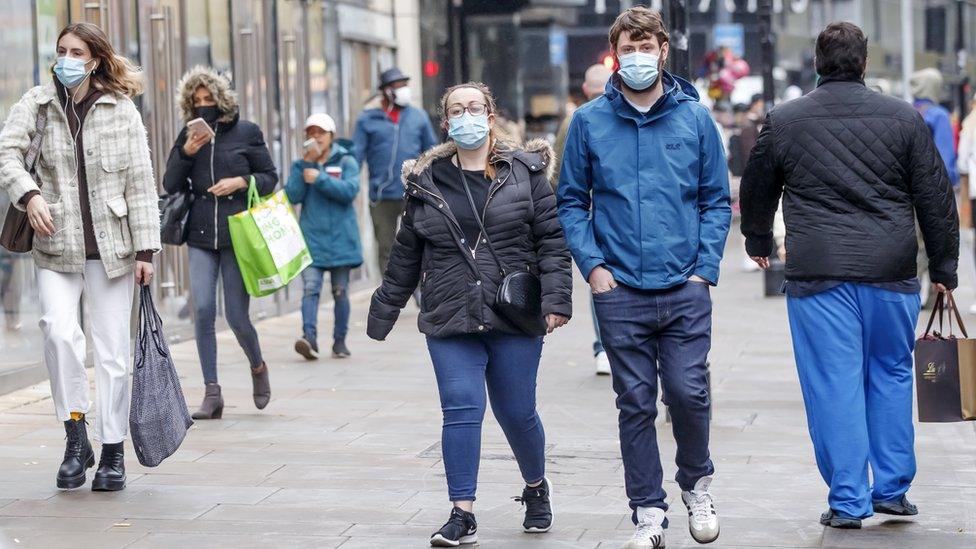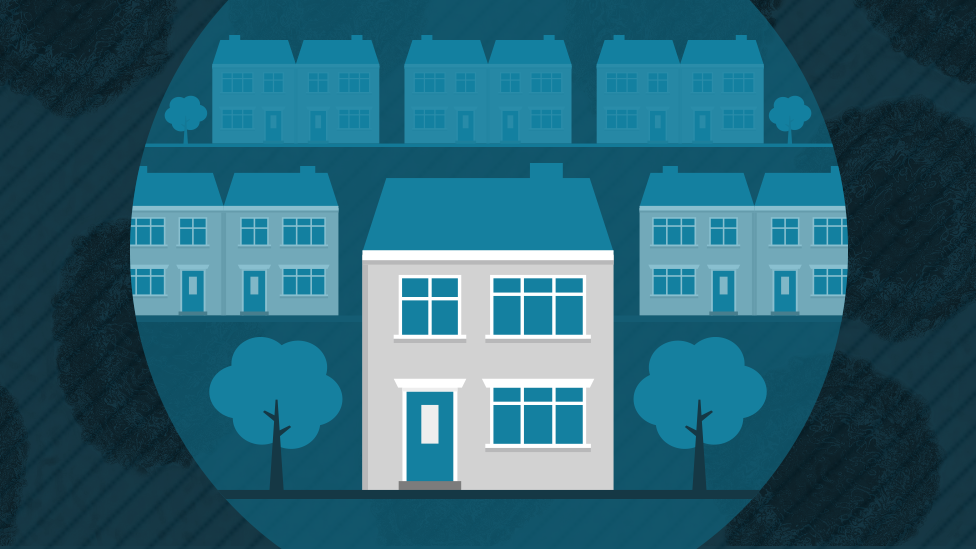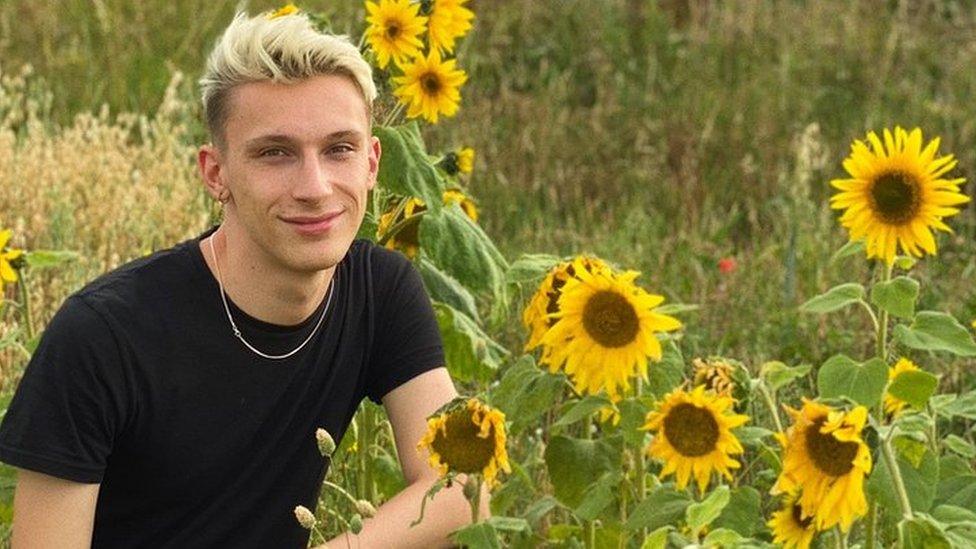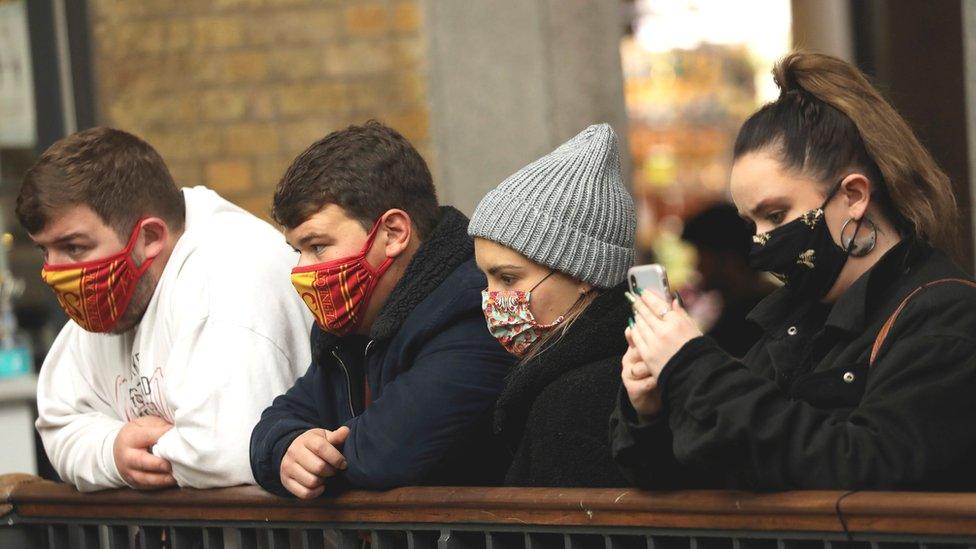Covid: Confusion over fresh talks in Manchester tier row
- Published

People in Greater Manchester are facing confusion over possible changes to Covid-19 rules, as local leaders denied Downing Street's claim that talks have been arranged to resolve a row.
No 10 told the BBC it had arranged a call with the region's mayor, Andy Burnham, on Sunday morning.
But Mr Burnham's office said no such call had been scheduled.
Tighter rules kicked in for millions of people in England on Saturday as areas moved up a tier in a new alert system.
BBC political correspondent Jonathan Blake said the conflicting information could be as a result of negotiating tactics.
The Department for Health and Social Care confirmed 16,171 more people had tested positive for coronavirus in the UK as of Saturday and a further 150 people had died within 28 days of a positive test - taking the total to 43,579.
Prime Minister Boris Johnson said on Friday that infection rates in Greater Manchester were "grave" and added: "Each day that passes before action is taken means more people will go to hospital, more people will end up in intensive care and tragically more people will die."
Mr Burnham and other local leaders have so far resisted a move from tier two to tier three's strict rules on hospitality - pressing instead for more shielding measures for the vulnerable, extra financial aid and stricter local powers to shut down venues breaking virus guidelines.
"We firmly believe that protecting health is about more than controlling the virus and requires proper support for people whose lives would be severely affected by a tier three lockdown," the deputy mayors and council leaders said in a joint statement.


When two sides cannot even agree on the arrangement of a phone call, it doesn't bode well for the bigger picture.
After 48 hours of stand-off between Downing Street and the mayor of Greater Manchester, it seemed there might be some progress.
Downing Street claimed they had "reached out" and a call had been arranged between Andy Burnham and No 10 for Sunday morning. But soon after that Mr Burnham's spokesperson said nothing had been agreed.
These moves could be seen as negotiating tactics, the result of a breakdown in communication or a lack of trust between the two sides.
They may also seem like a tedious running commentary on the logistics of negotiations, and on one level it is.
But as coronavirus cases continue to rise there is a lot riding on these discussions, or lack thereof.
People in Greater Manchester may be wondering how long it will be before action of some sort is taken, and what restrictions they'll be asked to endure when it is.

More than half of England - in excess of 28 million people - is now under extra coronavirus restrictions, under the new three-tier alert system.
Lancashire has joined the Liverpool City Region in the top tier - tier three. Pubs have closed and households cannot mix indoors or in many outdoor settings.
London, Essex, York, Elmbridge, Barrow-in-Furness, North East Derbyshire, Erewash and Chesterfield have moved into tier two, meaning they can no longer mix inside with those from other households, including in pubs and restaurants.
Areas of England in the lowest tier must keep to the nationwide virus rules such as group sizes being capped at six people, and the hospitality industry closing at 22:00.


Meanwhile, calls for a circuit-breaker - a short but strict national lockdown - have been supported by Labour as well as some Conservative MPs.
Kate Green, Labour MP for Stretford and Urmston, told BBC Radio 4's Today programme: "The Labour leaders in Greater Manchester support the call for a national circuit-break because what we're seeing in Manchester today - the rest of the country is coming along behind. The rate is rising everywhere."
Ms Green, who is also shadow education secretary, added that extra restrictions would not be effective without a package of support to "enable people to close their businesses [and] to isolate at home if they need to".
Conservative MP and former health secretary Jeremy Hunt called for an end to the "public war of words" between local and national leaders on Saturday, but added he had "sympathy" for the idea of a circuit-breaker.
Britain's largest teachers' union, the National Education Union, has called for secondary schools in England to shut for two weeks at half term, rather than the traditional one week.
Mr Johnson has said that while he could not "rule anything out", he wants to avoid a national lockdown because of "the damaging health, economic and social effects it would have".
There were scuffles between police and pub goers in Soho ahead of London moving to Tier 2
As coronavirus cases continue to rise rapidly across the UK, the devolved nations are taking their owns steps to curb the spread of infections.
Pubs, restaurants and cafes across Northern Ireland have closed to sit-in customers for the next four weeks while in Wales, talks continue over a potential two-week "fire break" - a period with tighter restrictions to help slow the spread.
Most licensed premises in Scotland's central belt are closed under temporary restrictions, which are expected to be replaced by a similar multi-tiered system to the one in England by the end of the month.

YOUR WORK, YOUR MONEY: Is my bar business better off in Tier 3?
WHAT PLANET ARE WE ON: Sir David Attenborough talks about the impact of the pandemic on tackling climate change


How have you been affected by coronavirus? What do the current restrictions mean for you? Share your experiences by emailing haveyoursay@bbc.co.uk, external.
Please include a contact number if you are willing to speak to a BBC journalist. You can also get in touch in the following ways:
WhatsApp: +44 7756 165803
Tweet: @BBC_HaveYourSay, external
Please read our terms & conditions and privacy policy
If you are reading this page and can't see the form you will need to visit the mobile version of the BBC website to submit your question or comment or you can email us at HaveYourSay@bbc.co.uk, external. Please include your name, age and location with any submission.
- Published17 October 2020

- Published26 January 2022

- Published17 October 2020

- Published20 November 2020
